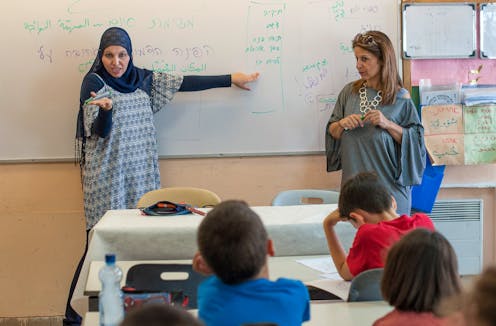
Uncommon Courses is an occasional series from The Conversation U.S. highlighting unconventional approaches to teaching.
Title of course:
Education in a divided society: The Israeli case
What prompted the idea for the course?
The United States recently marked 70 years since the Brown v. Board of Education decision that banned segregation in public schools. Around the same historical period, Israel instituted a divided education system based on nationality and religious observance, with four distinct school streams: Jewish secular, orthodox and ultra-orthodox schools taught primarily in Hebrew, and Arab schools taught in Arabic. It provided each community with a degree of autonomy within their schools.
As a graduate of the Israeli system who now teaches in the U.S., I often wonder: Is education in the U.S. truly no longer segregated? Does group recognition within the Israeli system come without discrimination? And how can the Israeli case, so different than the U.S. example in its framing of segregation, help us better understand American society and education policy?
This course is an opportunity to explore these questions. We speak about American and Israeli society as we reflect on the different values, policies and practices of each country’s education system.
What does the course explore?
This course delves into the intersection of education and divided societies through the case of Israel. We also explore the core values of societies and their educational frameworks, including schools, summer camps and universities that students in the class have attended. We analyze how these values shape policies of the countries the students come from. And we look at how these, in turn, impact social relations within each country.
We focus on three controversial topics to better understand the relationship between education policy and society: Israeli state-led core curriculum, segregation and free speech. For each topic, we examine the core values that make it controversial and analyze various approaches within the Israeli education system.
Students then choose education policy controversies in the U.S. such as book bans, affirmative action and performance and assessment measures. They then apply the analytical tools used in our discussions about Israel to research these U.S. education policies and lead class discussions on them.
Why is this course relevant now?
Students are inherently part of an education system. The invitation to critically engage with these systems as students progress into adulthood is crucial for their development as engaged citizens. It helps them consider not only individual interests but also the greater good.
While this course is timeless in its relevance, it’s particularly pertinent now. The Israel-Hamas war, which also highlights polarization in the U.S., is attracting global attention. Academic leadership, faculty and students in the U.S. are asking essential questions about solidarity, free speech, protecting group and individual rights, and their role in striving for a better future. The course allows us to engage with these questions while bridging academic theories and the complex realities of our changing world.
What’s a critical lesson from the course?
Education, like most things in life, is political. It encompasses more than just individual opportunities, performances, achievements or community ties. It also involves the broader society we live in and how educational systems reflect, construct and mitigate these aspects.
What materials does the course feature?
The course incorporates scholarly works, policy documents, news articles and TV shows.
Students engage with policy documents, such as Israel’s Declaration of Independence and a plan by the Israeli Council for Higher Education focused on increasing Arab student access to higher education.
We also look at examples of institutional policies such as the free speech guidelines of the Bezalel Academy of Art and Design and the mission statement of our own Washington University in St. Louis.
The Israeli TV show “The Lesson,” focused on free speech and its impact on classroom dynamics, is also a student favorite.
What will the course prepare students to do?
I hope students will develop independent opinions on education, divided societies and Israel. They should feel comfortable talking about these topics and be confident in voicing evidence-based positions.
Ayala Hendin does not work for, consult, own shares in or receive funding from any company or organization that would benefit from this article, and has disclosed no relevant affiliations beyond their academic appointment.
This article was originally published on The Conversation. Read the original article.







